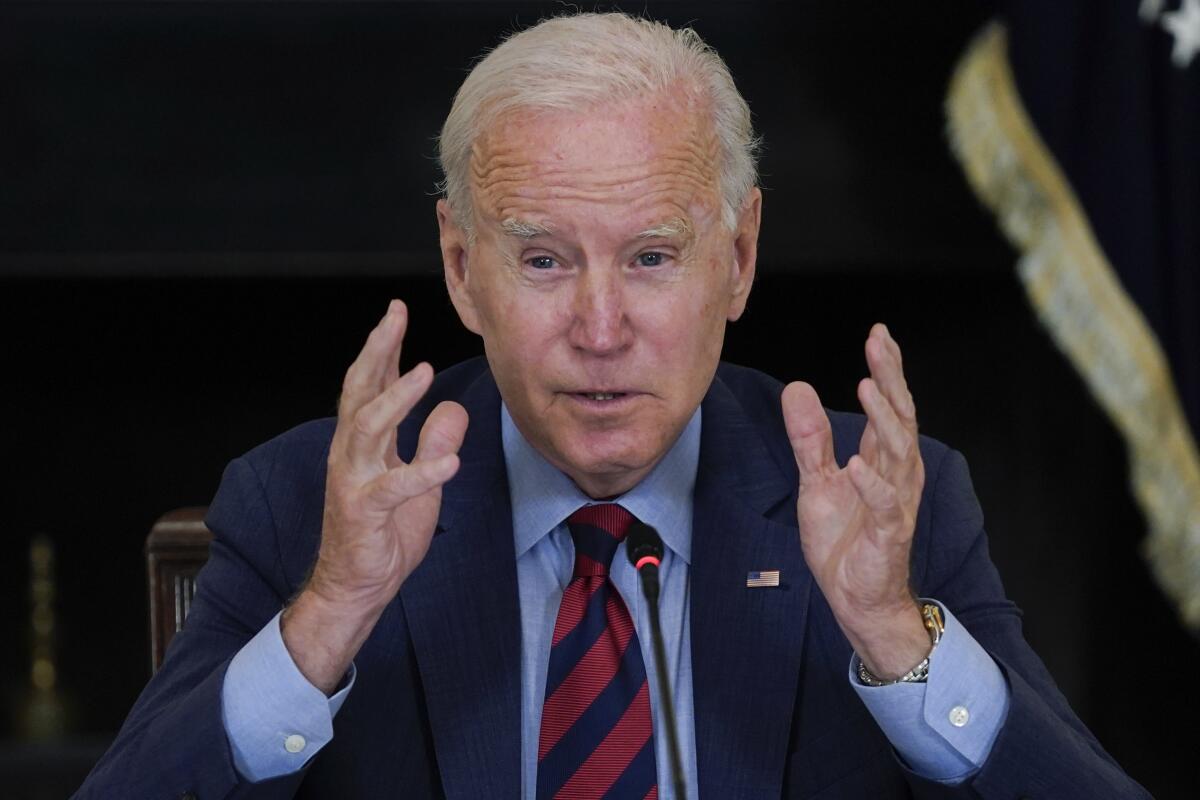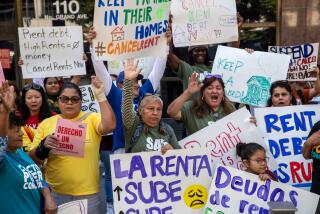Biden administration announces new two-month eviction moratorium

WASHINGTON — The Biden administration on Tuesday announced a new two-month federal moratorium on evictions to replace the broader one that expired over the weekend.
The new moratorium would take effect in areas where COVID-19 has been on the rise and last through Oct. 3, the Centers for Disease Control and Prevention said. The moratorium applies to counties facing high or substantial levels of the coronavirus and is estimated to cover about 90% of the U.S. population.
Without a federal moratorium in place, millions of Americans who fell behind on their rent during the pandemic faced eviction, depending on the patchwork of state policies.
California’s state eviction moratorium currently lasts until Sept. 30.
In a statement, CDC Director Dr. Rochelle Walensky called the moratorium “the right thing to do” to keep people in their homes and out of settings where COVID-19 can spread.
“Such mass evictions and the attendant public health consequences would be very difficult to reverse,” she said.
Biden previously said he did not have legal authority to renew the moratorium himself, and asked Congress to act. He said Monday he was still unsure if a new ban would pass constitutional muster, and constitutional scholars said it might not. But the president said that it would at least help Americans temporarily.
President Biden meets with Latino leaders on the second anniversary of the El Paso shooting as Democrats try to shore up support among Latino voters.
“By the time it gets litigated, it will probably give some additional time,” Biden said.
The Supreme Court narrowly rejected an attempt to end the previous eviction moratorium in June, but did not rule on whether the federal ban was constitutional.
Justice Brett M. Kavanaugh, who joined liberal justices and Chief Justice John G. Roberts Jr. to uphold the moratorium, made clear he would block any additional extensions unless there was “clear and specific congressional authorization.”
Since the White House’s abrupt announcement last week that Biden would not extend the moratorium, congressional leaders and the White House have passed the blame for who would be responsible for the millions of Americans who could be evicted.
Progressive Democrats lambasting the White House for not extending the moratorium led a pressure campaign urging Biden to act once it became clear Congress could not agree on an extension.
A small group of House lawmakers led by Rep. Cori Bush (D-Mo.) has slept on the outdoor steps to the House chamber for five days in an effort to draw attention to the issue. Bush said her protest was deeply personal because she had been evicted in the past, at one point living in a car with her small children.
“This is an enormous victory, and we laud the White House for listening to the clarion call of our members, our colleagues, and communities around the country,” Progressive Caucus Chairwoman Pramila Jayapal (D-Wash.) said. “The president clearly understands that we need to keep people in their homes.”
Many members pointed to Bush’s protest as integral to the new moratorium.
“I particularly applaud Rep. Cori Bush, who understands what it’s like to be evicted and who took her passion and turned it into amazingly effective action,” Senate Majority Leader Charles E. Schumer (D-N.Y.) said in a statement.
The extended moratorium gives states more time to distribute the $46.5 billion that Congress provided in the Emergency Rental Assistance program in January and March to those who need it.
The Treasury Department estimates that just $3 billion, or 7% of available funds, had been distributed by the end of June. Many states did not begin processing applications until June.
According to California’s Business, Consumer Services and Housing Agency, the state has distributed $242.65 million in rental assistance to 20,066 households as of Tuesday.
It’s a tiny portion of the $5.6 billion the state either has received or expects to receive from the federal Emergency Rental Assistance program, but more than double where the state was a month ago.
Agency spokesman Russ Heimerich said there has been a big uptick in applications since mid-June, when state lawmakers increased the potential reimbursement for rent to 100% and extended eviction protections until the end of September.
He said the agency is also working to cut its application processing time to two weeks by streamlining the paperwork and doubling the number of workers.
More to Read
Get the L.A. Times Politics newsletter
Deeply reported insights into legislation, politics and policy from Sacramento, Washington and beyond. In your inbox three times per week.
You may occasionally receive promotional content from the Los Angeles Times.













